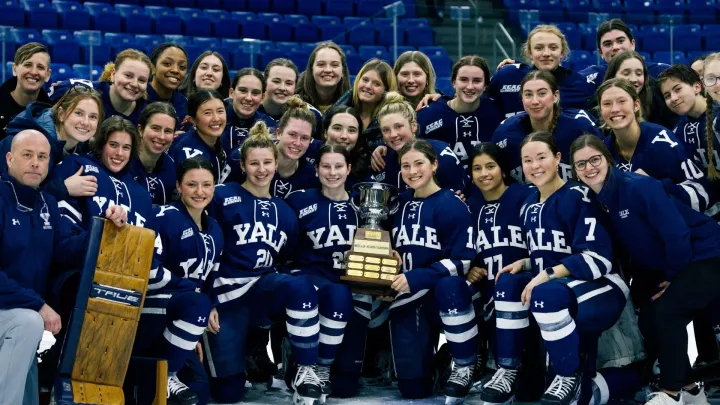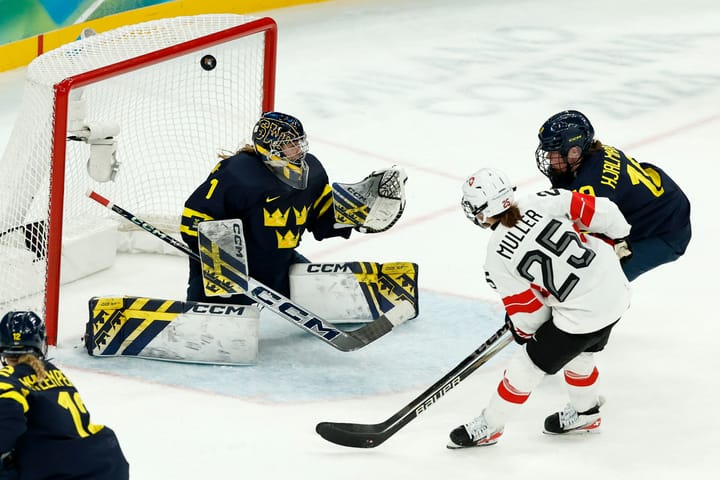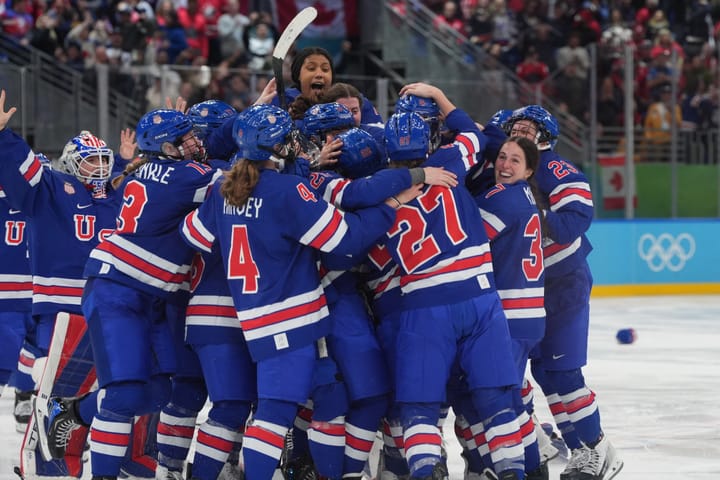A cry, a hope, a tribute to the Robert Morris women’s hockey program
As of Wednesday, RMU is shuttering its women’s (and men’s) Division I hockey teams
I don’t know if you’ve ever been around a college hockey program in the spring. In my experience, it’s a pretty quiet time of year. After the mad rush of the season, the churning pace of time yields, just a bit. The weather warms and the days melt into one another; the weeks fly by but each tick of the clock seems to linger a bit more, somehow.
It’s a time for reflection, and a reprieve from the constant swells between highs and lows during the season. The spring can often be bittersweet, as it is for most students—seniors graduate and classmates say goodbye for the summer. But it’s not supposed to be the time for soaring emotions; those are reserved for February and March, when most teams are huddled together in locker rooms and the crushing pain of one final loss pushes the sobs out in waves.
Once it’s spring, though, it’s time to turn the page and look ahead. There’s hard work to be done in the weight room and skills to sharpen on the ice. Next season is still months away but it’s surely coming, as certain as the sun will rise each day. This is the one constant which the revolving door of any hockey team orbits around. Some players will leave, most will return, and new faces will join, but the passing of spring and summer promises a new slate of games in the fall.
I wish that no one else would ever have to find out what it feels like when that door stops turning, the sun stops rising, and time grinds to a complete halt. I wish that no player would ever have to learn what it means to lose something that matters, deep, deep down, well after the last game has been played. I wish that no coach would ever have to watch the foundation of the teams they built crumble into dust, and the decades of work sift through their grasp.
It breaks my heart to say it, but at Robert Morris this week, they did. The university announced it’s cutting both the men’s and women’s hockey programs.
There are no words for what this is like. There is no way to understand what RMU’s players and staff and alumni and supporters are going through; even those of us who have been through something similar cannot possibly understand the depth of this for them. Only they know what it’s like to be part of that team and only they know what it’s like to lose it.
So I won’t water down their pain by trying to explain it or compare it or brush it away. I’m simply here to pay witness to it; to offer a shoulder to lean on to anyone reading; to once again hope this will be the last time (though I know it won’t be). I will write as much as I can and for as long as I can and use as many of my words as I can to say that this should never, ever happen again to a women’s hockey team, that they all deserve better. But it can’t change what happened at Robert Morris.
And while I’m here mainly to cover the RMU women’s team and honor them in whatever way I can, I also want to acknowledge the heartbreak the men’s team is going through, too. They deserve better, too.
Extremely hard to swallow and understand this one. Shocked and devastated is an understatement. https://t.co/5NWE1hGZVu
— Michaela Boyle (@michaelaboyle16) May 26, 2021
I’m not enough of a cynic to believe these decisions are ever made lightly; I am sure that Dr. Howard and the rest of the university’s leaders believe that they’re doing the right thing. I’m also extremely certain we have very different definitions of what the right thing is.
When teams are cut, the first thing you’d expect is some measure of somber acknowledgement. Some sense of mourning. Even if university heads are secretly a tiny bit ecstatic because they are so convinced this is the right strategy.
Anyway, that’s not what we got from Robert Morris, from my vantage point. Instead, we got a carefully crafted, forward-looking statement that is entirely unapologetic in its certainty that this is good news, actually. Sure, it sucks that entire teams of players and staff will have their lives uprooted. Some (many?) will face the ends of their careers. Almost all of them will never get to pull on a jersey with their teammates and best friends again.
But that’s not the main takeaway here, I guess. The university is charting a strategic course, you see. They are positioning themselves to be agile and professionally focused. They are entering their second centennial and carrying Robert Morris forward into new successes.
But they couldn’t find a way to take everyone with them; what, I have to ask, is the cost of leaving some behind? Universities are not runaway trolleys speeding towards one track with 50 trapped people and a second track with two, needing to choose between them. They are not a lifeboat with room for only half the sinking ship. They are not supposed to sacrifice the few to save the many, and who is to say that doing so will even pan out? If they’ll sacrifice people now, certainly they’ll do it later on, too.
University leadership will almost definitely talk about this as if it was a necessary move; I’d say chances are slim that it was the only move on the table. I don’t know what the alternative is, which is probably unfair of me, but I do know that there are people at higher ed institutions who get paid a lot of money to figure it out. The pandemic was a completely unforeseeable event, sure, but there are people who get paid a lot of money to plan for the unexpected, too. I know it was never Paul Colontino’s or Derek Schooley’s job to figure out what it takes for hockey to be financially viable within the landscape of the university; that was someone else’s job, and someone else’s failure.
Commentary from @MattGajtka: #RMU's shortsighted, misguided priorities failed its hockey teams.https://t.co/owXHDgZbMw pic.twitter.com/OOVJeiwFW5
— Pittsburgh Hockey Digest ✋🏒 (@PghHockeyDigest) May 27, 2021
This decision would have been devastating no matter what. I’m not going to pretend I’d like the result any better if there was more notice given, or if they handled it differently. But it’s worth pointing out that the circumstances around it are crap, and the way they handled it deserves to be critiqued.
As many others have noted, this is an awful time to be trying to transfer somewhere else. With many players getting an extra year of eligibility, the transfer pool is crowded as is. It’s now practically June and there are just not enough spots to go around. RMU’s recruits are probably in an even worse position, too. Many of these players will be competing for spots against each other, which is a level of cruelty that is hard to even fathom.
The timing is particularly brutal for another reason. The school year is over and many players aren’t even together on campus. There is not even solace to be found in getting to say goodbye. There will be no final skate together, no final night out with each other. It’s not that their time together is finite; it’s that the clock has already run out, and they didn’t even know it. What closure is there to be found in a grid of tear-streaked faces, spliced together on a Zoom call?
There is no sugarcoating this. I would love to say that players will all land on their feet and every day in the future will be a little better; that every goal they score and every class they ace and every success they have will ease the pain a little bit more. But I don’t know for sure. I have faith that healing will come eventually, but it’s not an easy road ahead. And they can’t walk it together.
Here’s what I know about the Robert Morris women’s hockey team, though: I know they spent years building a respectable, competitive program. I know the championships and NCAA Tournament appearances were well-earned, and they were always a worthy opponent when they faced top-ranked teams. I know they made a difference to their fans and in their community.
For a lot of people involved, the hardest part will be feeling like they could have done something more; in reality, they did all they could, and then some. It will feel like everything they accomplished is being erased, like it doesn’t matter, like it never mattered at all. But it couldn’t possibly matter more. I hope only that they can find peace in that themselves.





Comments ()